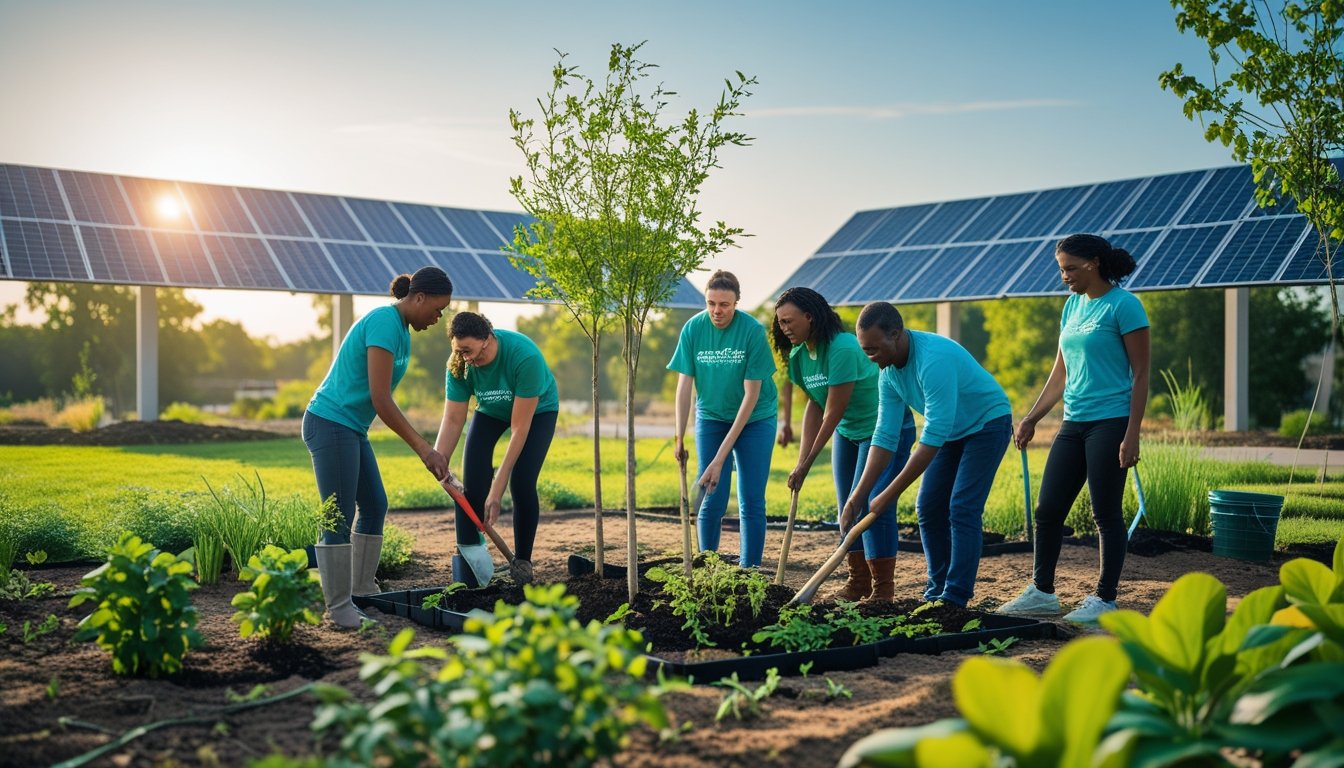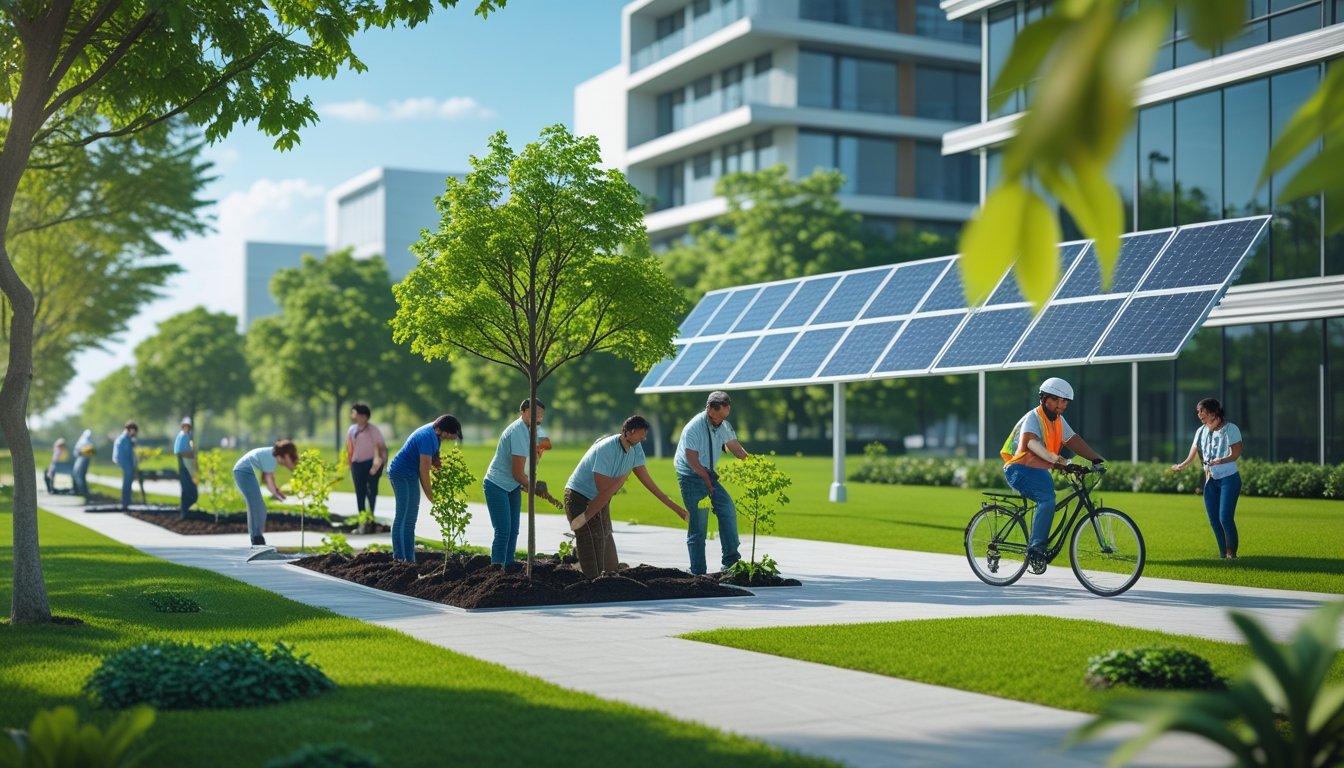Late updated: 06 Sep 2025 10:09
Written by: Ella Thompson
Eco-Conscious Strategies For Sustainable Recovery Journeys: Effective Methods For Environmental Restoration
Embarking on a sustainable recovery journey is not just about personal healing; it’s about creating harmony between our well-being and the environment. By incorporating eco-conscious practices, we can foster a supportive environment that enhances recovery while reducing our ecological footprint. This balance is essential as it not only aids personal sobriety but also contributes positively to environmental health.

In our exploration of sustainable recovery strategies, we look at various methods like integrating nature-related activities and adopting green living habits. These practices, seen as instrumental in bolstering both mental and physical health, open new avenues for those seeking holistic healing processes. They empower individuals to nurture themselves while caring for the planet.
Eco-friendly approaches in recovery invite us to reconsider our habits and choices. Supporting our wellness journey with sustainable practices illuminates a path where personal and environmental health coexist. Exploring these strategies paves the way for us to champion a mindful, balanced recovery experience.
Key Takeaways
- Eco-conscious practices aid personal recovery and environmental health.
- Nature-inspired and green living habits enhance healing.
- Sustainable recovery fosters balance between self-care and environmental responsibility.
Core Eco-Conscious Strategies for Sustainable Recovery Journeys

Embarking on a sustainable recovery journey involves incorporating eco-friendly practices, fostering mindful engagement with nature, shaping supportive environments, and encouraging community-based environmental efforts. These elements not only benefit us individually but also contribute positively to our surroundings.
Integrating Eco-Friendly Practices into Recovery
Incorporating eco-friendly practices into our recovery can make a significant difference. This includes adopting sustainable living habits like choosing reusable products, reducing waste, or consuming locally sourced foods. These behaviours enable us to lower our environmental footprint while enhancing our personal well-being. Efforts such as community gardening or participating in eco-focused therapy can foster a sense of connection with our environment. By taking conscious steps toward green living, we align our recovery with broader environmental goals, thus reinforcing our commitment to sustainable living while nurturing our mental health.
Building Supportive and Sustainable Environments
Our recovery spaces play a crucial role in promoting eco-conscious living. Creating an environment that supports sustainable practices can include using energy-efficient appliances, implementing recycling programmes, and encouraging green commuting. Designing spaces that incorporate natural elements, like house plants or natural light, can enhance mental wellness. Such measures ensure that the environments where we recover not only support our individual healing but also foster sustainable living. This demonstrates our commitment to both personal and environmental well-being, creating a robust foundation for our journey.
The Role of Mindfulness and Nature-Based Activities
Mindfulness and nature-based activities are integral to sustainable recovery. Practices such as forest bathing, meditative walks, or simply spending time outdoors help us reconnect with nature. These activities not only boost our mental health but also foster a deeper appreciation for the environment, encouraging behaviours that support sustainability. Engaging in mindful routines like yoga or meditation amidst nature can reinforce eco-friendly living. These practices promote inner peace while cultivating an enduring connection with our planet, essential for those on a recovery path.
Promoting Community Engagement and Environmental Stewardship
Community involvement is a cornerstone of sustainable recovery. Engaging with community-based environmental projects, such as tree planting or conservation efforts, nurtures a sense of shared responsibility for our planet. These activities foster social connections and encourage a collective approach to sustainability. Participating in local green initiatives or eco-themed support groups can further our recovery by embedding us in an eco-conscious community. Ultimately, nurturing a culture of environmental stewardship within our support networks can fortify our personal recovery journey while contributing to broader ecological well-being.
Practical Applications for Sustainable Healing

Embracing sustainable healing involves engaging with mindful practices that benefit both our health and the planet. Our approach focuses on energy conservation, eco-conscious eating habits, and the utilisation of renewable energy, all crucial for fostering mental and environmental well-being.
Energy Conservation and Waste Management
In our quest for sustainable healing, conserving energy and managing waste effectively play pivotal roles. Simple practices such as turning off lights when not in use and utilising energy-efficient appliances can have a significant impact. Moreover, incorporating recycling into daily routines minimises waste, reducing environmental footprints.
Engaging in community clean-up efforts not only aids in waste management but also cultivates a sense of collective responsibility and pride. We encourage everyone to explore composting organic waste, as this reduces landfill contributions and enriches soil. By integrating these habits, we contribute to a healthier environment and enhance our mental clarity and sense of purpose.
Establishing Mindful and Eco-Conscious Eating
Mindful and eco-conscious eating is essential for sustainable healing. Choosing local and organic produce supports environmental sustainability and reduces our carbon footprint. Paying attention to food origin and packaging helps us make informed choices that are gentler on the planet.
Practicing mindful eating by focusing on the taste, texture, and aroma of food can improve digestion and mental well-being. Moreover, reducing meat consumption and experimenting with plant-based diets can further lessen environmental degradation. Our collective effort in adopting these practices nurtures both personal health and the well-being of our environment.
Incorporating Renewable Energy and Minimising Environmental Degradation
Utilising renewable energy resources is a significant step towards sustainable recovery. Solar panels and wind turbines can dramatically cut down household carbon emissions and align our lifestyles with eco-friendly living. By opting for renewable sources, we not only reduce dependence on fossil fuels but also inspire others to embrace similar pathways.
Furthermore, preserving natural resources through conscious water use and pollutant reduction is vital. By engaging in activities such as planting trees and supporting green energy initiatives, we actively contribute to minimising environmental degradation. These efforts collectively pave the way for a sustainable, harmonious relationship with nature, fostering long-term healing and environmental sustainability.
Frequently Asked Questions

Integrating sustainability into addiction recovery requires a creative blend of practical strategies and community cooperation. By maintaining mindful habits and embracing nature-based therapies, we support both personal healing and environmental health.
What are effective methods for integrating sustainability into addiction recovery programmes?
Sustainability in recovery can be achieved through practices like reducing waste, using renewable resources, and incorporating green initiatives. Programmes may include gardening projects, energy-efficient facilities, and workshops on sustainable living. By aligning recovery processes with ecological principles, we facilitate a comprehensive healing approach.
How can individuals in recovery reduce their environmental footprint while maintaining their health and well-being?
Individuals can minimise their environmental impact by adopting eco-friendly habits such as cycling instead of driving, using biodegradable products, and consuming locally sourced, organic foods. These practices not only contribute to a healthier planet but also enhance physical health and emotional well-being.
In what ways can therapy and counselling approaches be designed to support both mental health and environmental sustainability?
Therapy and counselling can integrate nature-based methods like eco-therapy, which involves spending time in natural settings for stress reduction and mental rejuvenation. Techniques such as mindfulness meditation, paired with environmental awareness education, strengthen the connection between mental health recovery and eco-sustainability.
What role do community support systems play in promoting eco-friendly practices in recovery journeys?
Community support systems play a pivotal role by promoting shared values and encouraging eco-conscious behaviours. Support groups can organise activities like community clean-ups and sustainability workshops. These collective efforts foster a sense of belonging and shared responsibility among participants.
What are the benefits of using green spaces and nature-based interventions in addiction recovery?
Green spaces provide an inviting environment for relaxation, reflection, and physical activity. Nature-based interventions have been shown to reduce anxiety, improve mood, and support recovery from addiction. Access to outdoor settings can facilitate a holistic recovery experience that bolsters resilience and emotional health.
How can recovery facilities implement sustainable operations without compromising the quality of care provided?
Recovery facilities can adopt sustainable practices by utilising renewable energy, implementing water conservation strategies, and reducing waste. By training staff and residents in sustainability, facilities create a culture of environmental responsibility that complements the quality of care offered.
